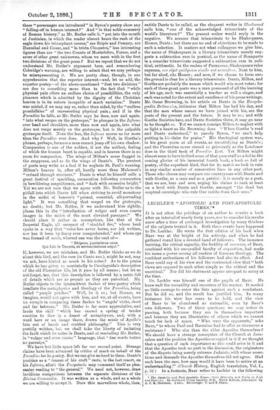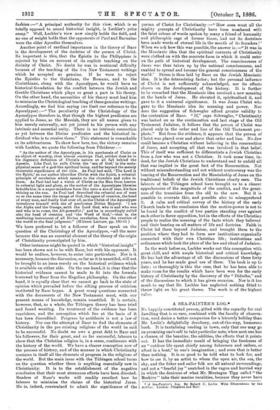LECHLER'S "APOSTOLIC AND POST-APOSTOLIC TIMES."
IT is not often the privilege of an author to rewrite a book after an interval of nearly forty years, nor to consider his results anew after a time of prolonged investigation by many thinkers of the subjects treated in it. Both these events have happened to Dr. Lechler. He wrote the first edition of his book when Baur was at the height of his activity, and when he had gathered round him a devoted band of followers. The immense learning, the critical sagacity, the fertility of resource, of Baur, combined with his unequalled faculty of exposition, had made his name a power among all readers of German theology. The confident enthusiasm of his followers had also its effect. And Baur could say of his view and the contrasted view that " both views are opposed to each other simply as the critical and the uncritical." Nor did his statement appear arrogant to many at the time.
Dr. Lechler was himself one of the pupils of Baur. He knew well the versatility and resources of his master. It needed no little courage to enter the lists against such a combatant. But he did so, and the result has justified him. In many instances his view has come to be held, and the view of Banr to be abandoned as untenable, even by Baur's own followers. Two of these questions we may notice in passing, both because they are in themselves important and because they are illustrative of others which we cannot touch for lack of space. " Who were the opponents," asks Baur," to whom Paul and Barnabas had to offer so strenuous a resistance Who else than the elder Apostles themselves ? We should have a strange conception of the Church at Jeru- salem and the position the Apostles occupied in it if we thought that a question of such importance as this could arise in it and that the Apostles took no part in the discussion, the originators of the dispute being merely extreme Judaists, with whose asser- tions and demands the Apostles themselves did not agree. Had such been the case, how easy would it have been to arrive at an understanding !" (Church History, English translation, Vol. I., p. 52.) In a footnote, Baur refers to Lechler in the following ' The Apostolic and Post-Apostalie Timm: their Nativity and Unity in Life and Doctrine. By Gotthard Victor Lechler, D.D. Third Edition, translated by A. 3, x. Davidson. 2 vols. roimbnigh : T. and T. Mark.
fashion :—" A principal authority for this view, which is so totally opposed to sound historical insight, is Lechler's prize essay." Well, Lechler's view now simply holds the field, and no one of weight holds that the opponents of Paul and Barnabas were the elder Apostles themselves.
Another point of cardinal importance in the theory of Baur is the development of the doctrine of the person of Christ. So important is this, that the Epistle to the Philippians is rejected by him on account of its explicit teaching on the divinity of Christ. No doubt he was in continual difficulty because of the teaching of the five New Testament writings which he accepted as genuine. If he were to reject the Epistles to the Galatians, the Romans, and to the Corinthians, along with the Apocalypse, he would have no historical foundation for the conflict between the Jewish and Gentile Christians which plays so great a part in his theory. On the other hand, the necessities of his theory must lead him to minimise the Christological teaching of these genuine writings. Accordingly, we find him saying (we limit our reference to the Apocalypse) :—" The peculiarity of the Christology of the Apocalypse therefore is, that though the highest predicates are applied to Jesus, as the Messiah, they are all names given to him merely externally, not yet joined to his person with any intrinsic and essential unity. There is no intrinsic connection as yet between the Divine predicates and the historical in- dividual who is to receive them." This statement is remarkable an its arbitrariness. To show how here, too, the victory remains with Lechler, we q note the following from Pfleiderer
" As the author of the Apocalypse, in his apotheosis of Christ as an object of worship, thus almost outstrips Paul, neither does he in his dogmatic definition of Christ's nature at all fall behind the Apostle. Like Pan], he calls Christ the 'son of God,' in the meta- physical sense of a god-like spiritual being, and far beyond the merely theocratic significance of the title. As Paul had said, ' The Lord is the Spirit,' so our author identifies Christ with the Spirit, a celestial principle of revelation which speaks to the churches and rules in them. As Paul had had a vision of Christ as the Man from heaven in celestial light and glory, so the author of the Apocalypse likewise beholds him in a super-mundane form like unto a son of man, his face shining as the sun. As Paul had described the celestial son of man as at the same time the image of God, the agent of creation, the head of every man, and finally God over all, so the Christ of the Apocalypse introduces himself with the of predicates Divine Majesty. I. am the Alpha and the Omega, saith the Lord God, who is and who was and who is to come, the All-powerful ;" and he is accordingly called also the head of creation and 'the Word of God,'—that is, the mediating instrument of all Divine revelation, from the creation of the world to the final judgment." (Hibbert Lecture, pp. 160-61 )
We have preferred to let a follower of Baur speak on the question of the Christology of the Apocalypse, —all the more because this was an essential element of the theory of the origin of Christianity promulgated by him.
Other instances might be quoted in which "historical insight" has been shown not to be with Baur, but with his opponent. It would be endless, however, to enter into particulars. Nor is it necessary, because the discussion, so far as it is unsettled, will not be brought to an issue merely on the historical evidence which is available on either side. On the one hand, it is clear that the historical evidence cannot be made to fit into the formula borrowed by Baur from the Hegelian philosophy. On the other hand, it is equally clear that we cannot go back to the state of opinion which prevailed before the sifting process of criticism instituted by Baur began. A great many questions connected with the documents of the New Testament must, with our present means of knowledge, remain unsettled. It is certain, however, that, as a whole, the Tiibingen theory has been tried and found wanting. Its treatment of the evidence has been capricious, and the conception which lies at the basis of it has been discredited. Progress by antithesis is not a law of history. Nor can the attempt of Baur to find the elements of Christianity in the pre existing religions of the world be said to be successful. No doubt we owe a great debt to Baur and his followers, for their great, and so far successful, labours to show that the Christian religion is, in a sense, continuous with the history of the world. We have a clearer conception now of the process of history, and of the manner in which Christianity contains in itself all the elements of progress in the religions of the world. But the main issue with the Tiibingen school turns on the question whether there is anything essentially new in Christianity. It is to the establishment of the negative conclusion that their most strenuous efforts have been directed. Readers of Baur's works will , readily recollect how he labours to minimise the claims of the historical Jesus. He is, indeed, constrained to admit the significance of the person of Christ for Christianity :—" How soon must all the mighty precepts of Christianity have been numbered with the faint echoes of words spoken by many a friend of humanity and philosophic sage of former times, had not its doctrines been made words of eternal life in the mouth of its founders !" When we ask how this was possible, the answer is :—" It was in the Messianic idea that the spiritual contents of Christianity were clothed on with the concrete form in which it Could enter on the path of historical development. The consciousness of Jesus was thus taken up by the national consciousness, and enabled to spread and become the general consciousness of the world." Stress is thus laid by Baur on the Jewish Messianic idea. It is the determining factor; but the personal influence of Christ is not sufficiently acknowledged, nor its effects shown on the development of the history. It is further to be remarked that the Messianic idea received a new meaning at the hands of Jesus. He elevated it, spiritualised it, and gave to it a universal significance. It was Jesus Christ who gave to the Messianic idea its meaning and power. Nor does the suggestion of Schwegler afford greater validity to the contention of Baur. " If," says Schwegler, " Christianity was looked on as the continuation and last stage of the Old Testament Judaism, it follows that the person of Christ was placed only in the order and line of the Old Testament pro- phets." But from the evidence, it appears that the person of Christ was placed over and above that order and line. No Jew could become a Christian without believing in the resurrection of Jesus, and accepting all that was involved in that belief. This of itself was sufficient to differentiate a Jewish Christian from a Jew who was not a Christian. It took some time, in- deed, for the Jewish Christians to understand and to unfold all that was implied in the great fact of the Resurrection. Not without misunderstanding and not without controversy was the bearing of the Resurrection and the Messiahship of Jesus on the traditional beliefs of the Jewish Christians clearly seen. The labours of the Tiibingen school have brought us to a clearer apprehension of the magnitude of the conflict, and the great- ness of the transition from the old to the new. But it is possible to overrate this, and possible also to misapprehend it. A calm and critical survey of the history of the early Church leads to the conclusion that the motive-power is not to be found in the conflict of two parties standing over against each other in fierce opposition, but in the efforts of the Christian people to realise the meaning of the facts which they believed and their bearing on all matters of life and doctrine. Faith in Christ led them beyond Judaism, and brought them to the position where they had to form new institutions organically connected with their own Christian life ; institutions and ordinances which took the place of the law and ritual of Judaism.
In the work before us, Lechler works out this conception with great skill, and with ample historical and critical knowledge. He has had the advantage of all the discussions of these forty years, and he has made good use of them. The book is up to date ; so thoroughly is this the case, that he has been able to make room for the results which have been won for the early history of Christianity by the discovery of the " Didoche," and of the discussions to which it has given occasion. Nor is it too much to say that Dr. Lechler has neglected nothing fitted to throw light on his great theme. The work is of the highest value.



































 Previous page
Previous page